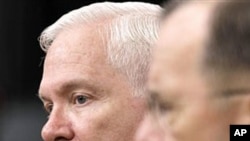Top U.S. military officials are scheduled to testify Thursday at a Senate hearing on a proposal to repeal a law that mandates homosexual troops be discharged if their sexuality becomes known. The testimony follows the release of a Pentagon study predicting minimal impact if gays are allowed to serve openly in the U.S. military. Although the positions of the secretary of defense and the chairman of the Joint Chiefs of Staff are well known, The response of many senators is difficult to predict and the repeal is far from certain.
On Tuesday, Defense Secretary Robert Gates and Joint Chiefs of Staff Chairman Admiral Michael Mullen presented the results of a 10-month study on the effect of repealing the law known as "Don't Ask, Don't Tell." They also unveiled recommendations for implementing what would be the most sweeping change in military personnel policy since women were allowed in limited combat roles nearly 20 years ago.
A survey of U.S. troops and their families shows pockets of resistance to allowing openly-gay military service. But a majority of service members have few, if any, objections to serving alongside homosexual colleagues. And the study predicts minimal impact on troop morale or combat effectiveness, if the law is repealed.
Defense Secretary Robert Gates:
"This can be done, and should be done, without posing a serious risk to military readiness," said Gates.
Gates gave a preview of what he is likely to tell the Senate Armed Services Committee on Thursday - that the policy should end by an act of Congress rather than by a judicial ruling. An appeal is underway following a federal court decision striking down "Don't Ask, Don't Tell" as unconstitutional.
"I strongly urge the Senate to pass this legislation and send it to the president before the end of this year," he said. "It is only a matter of time before the federal courts are drawn once more into the fray."
The House of Representatives already has voted to end the ban. In the Senate, the measure has been attached to an annual defense spending bill. In September, Republicans used procedural motions to block consideration of the bill.
Republican Senator John McCain of Arizona led the filibuster, saying that no action should be taken until the Pentagon study was released.
"It is all about the battle effectiveness and morale of the men and women in the military today," said McCain. "I think we owe them the right to have their voices heard before we act."
Two weeks ago, details of the Pentagon report were leaked, showing majority troop support for ending the ban on gays in the military.
McCain, the top Republican on the Senate Armed Services Committee, called the study flawed.
"This study was directed at how to implement the repeal, not whether the repeal should take place," he said.
Several Democratic senators welcomed Tuesday's release of the Pentagon report.
Senate Majority Leader Harry Reid:
"The report is just common sense," said Reid. "It has been shown time and time again that having gays in the military does not hurt the military. It improves the military."
Most Republicans opposed to lifting the ban declined to comment on the Pentagon report ahead of the Senate hearings. In addition to Secretary Gates and Admiral Mullen, the hearings are scheduled to include testimony by the chiefs of each of the armed forces, some of whom have voiced deep reservations about ending "Don't Ask, Don't Tell""
The fate of the ban might rest with a handful of moderate Republicans who have signaled their willingness to support repeal, but who voted with their party in September to sustain the filibuster. At the time, Republican Senator Susan Collins of Maine objected to constraints imposed by Democratic Majority Leader Reid on the terms of debate.
"I think we should welcome the service of these individuals who are willing and capable of serving their country," said Collins. "But I cannot vote to proceed to this bill under a situation that is going to shut down the debate."
Ever since, Collins has been questioned by reporters as to whether she would change her vote. After the report's release, a clearly-frustrated Susan Collins responded this way:
"I have explained my position to you 5,000 times, maybe 5001," she said.
Collins said she would vote to lift the ban on openly-gay military service only if she is convinced that doing so will not harm the armed forces and only under an open-amendment process in the Senate.
Repealing "Don't Ask, Don't Tell" is one of many items Democrats hope to accomplish in a brief end-of-year congressional session. But Republican leaders - and even some Democrats - have listed economic and fiscal matters as their sole priority. The Pentagon report and the testimony of military leaders might boost legislative support for ending the ban. Whether it reaches the Senate floor in coming weeks remains an open question.
US Defense Chief to Urge Senate to Lift Ban on Openly-Gay Military Service




